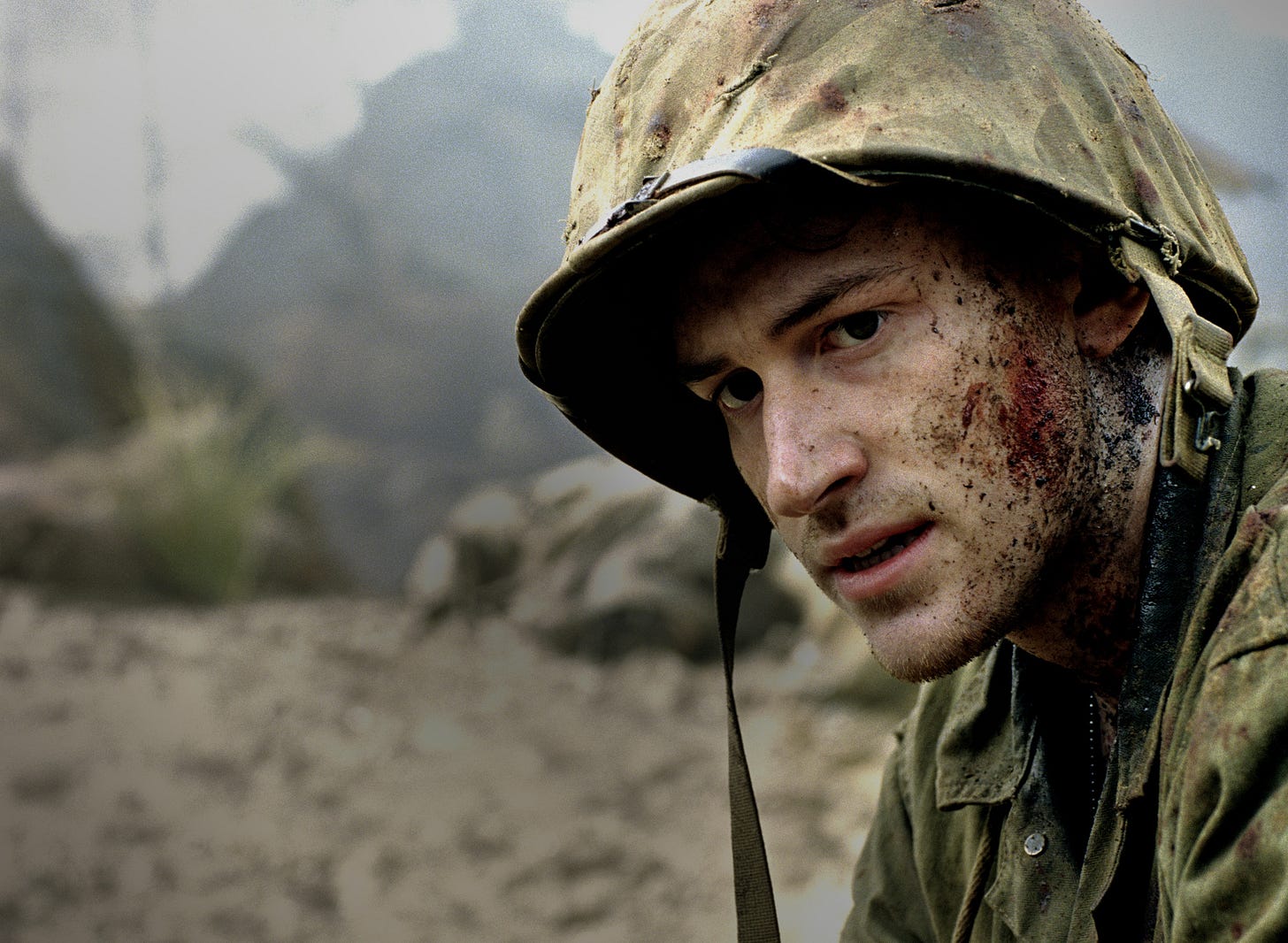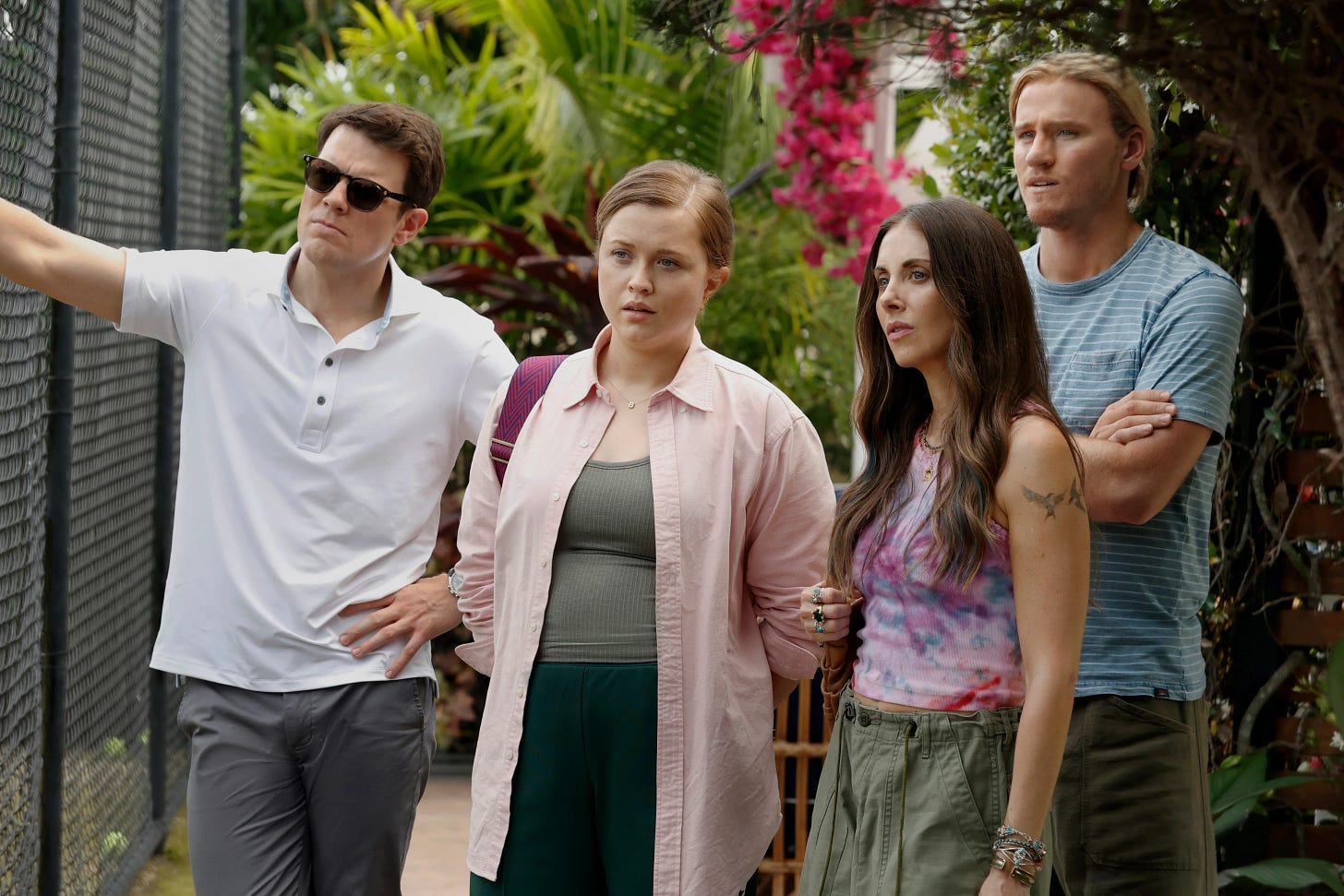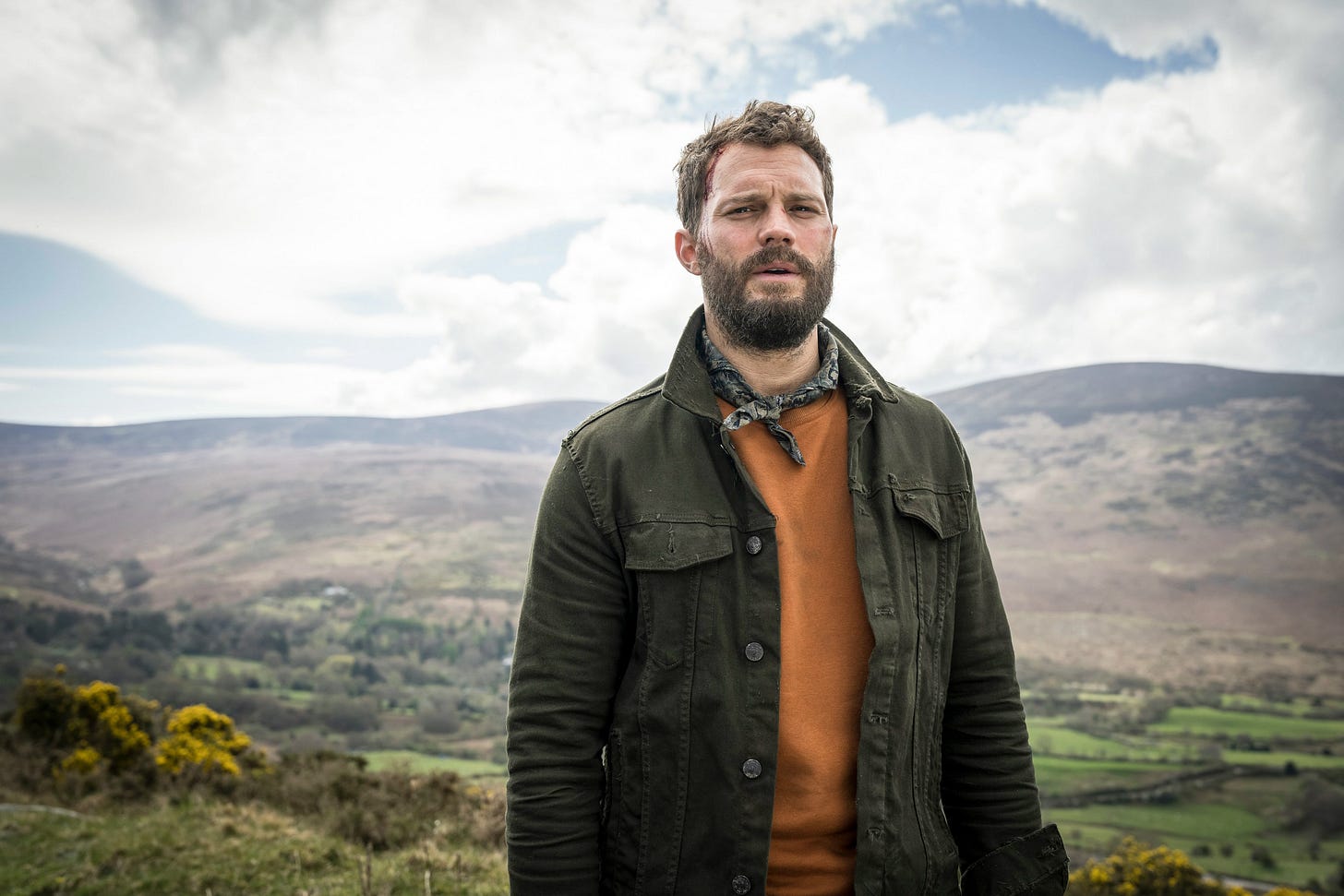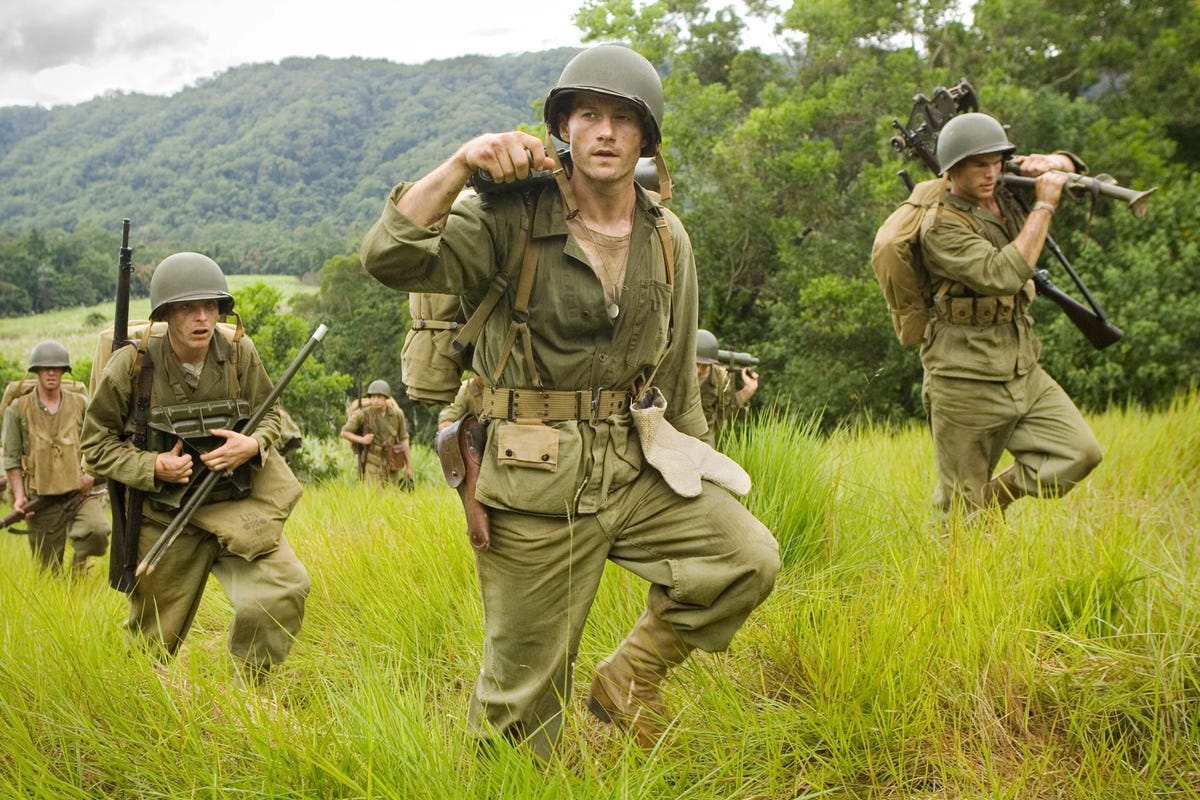Back to 'The Pacific'
The end of 'Masters of the Air' inspires a revisit of the last Hanks/Spielberg WWII epic, plus 'Girls5eva,' 'The Tourist,' 'Apples Never Fall,' and more
This week’s What’s Alan Watching? newsletter coming up just as soon as I wrestle in jorts…
Emmy-bait often falls?
March is the beginning of Emmy-bait season, the three-month period we get every year where every streamer and cable channel floods the zone with star-studded shows — most of them limited series — that they hope will score big at the Emmys. The Emmy eligibility window closes at the end of May, and voting begins not long after, so this is viewed as the best way to keep shows fresh in the minds of voters.
The problem is that, because everybody does it, almost all of these shows come and go without anyone noticing them. And most are so forgettable that I had to Google things like “Jennifer Garner based on book Apple” while writing a story about this phenomenon. Technically, it’s a review of Peacock’s new Apples Never Fall, with Annette Benning, Sam Neill, and Alison Brie starring in an adaptation of yet another Liane Moriarty mystery/comedy novel. But that show is so unremarkable that it only felt column-worthy as an example of this larger point.
The one point I neglected to make in that column, in between discussion of Apples Never Fall itself, is that the spring window strategy ignores the fact that most of the big miniseries Emmy success stories don’t actually debut in the spring. If you look at the Outstanding Limited or Anthology Series winners going back to 2015, the only ones that actually premiered during one of those months are Beef and Chernobyl. Everything else, like White Lotus, Watchmen, and The Queen’s Gambit, launched in summer, fall, or early winter, where they had opportunity to stand out. Being much better than the likes of WeCrashed helps, too.
Caught in the Netflix
Like the Apples Never Fall piece, this week’s other Rolling Stone column also was originally planned as a straightforward review of a streaming show: in this case, a belated take on the second season of The Tourist, a BBC thriller that first arrived in America a couple of years ago on what was then called HBO Max, and now streams on Netflix. I liked the few episodes I watched of the first season, but never got a chance to finish it, and the shift to Netflix provided the inspiration to return.
But as I began outlining my review of this season — which I really enjoyed, other than an annoying and slightly off-tone subplot about one character getting locked in a dungeon — it occurred to me that the reason I was writing it should actually be the subject. So instead, it’s now a larger story about the Netflix Effect, where pre-existing shows that began life elsewhere in the TV ecosystem wind up on Netflix, and people treat them like they' were always there to begin with. In the process, I fold in discussion of Girls5eva, which yesterday jumped from Peacock to Netflix for its new third season; Resident Alien, which began streaming its first two seasons on Netflix last month right as the third was debuting on Syfy; and other variants of a phenomenon that’s been happening practically since Netflix shifted from a mail-order DVD rental company into a streaming service.
(For what it’s worth, Resident Alien is another show where I watched the first couple of episodes a few years ago, liked parts of it — specifically, Alan Tudyk’s performance — and then got too caught up in other things to return to it. It’s my current laundry-folder, as I’m early in the second season, so I pay a lot of attention when he’s on screen and substantially less when, say, there are subplots about the mayor’s marital difficulties.)
War is hell, times two
The Masters of the Air finale is now streaming. I don’t have a lot more to say beyond what I wrote before the miniseries debuted: incredible combat sequences, weak characterization, and disjointed storytelling overall. Parts of it left me in awe, but most of it left me frustrated, particularly the slapdash approach to various arcs. If Rosie was going to be the main character for most of the second half, for instance, why didn’t he get more attention before the other guys wound up dead or in a POW camp? Why devote time to the downed airmen escaping Belgium if the story was going to be mostly abandoned partway through? Why bother with the Tuskegee Airmen at all if they’re only going to be introduced in the penultimate episode, rather than doing some kind of parallel narrative between the two groups of pilots, which would converge at Stalag Luft III?
The disappointment of Masters inspired me to finally revisit the middle entry in the Hanks/Spielberg World War II trilogy. I’ve seen Band of Brothers in part or in full at least a half-dozen times, but I only watched The Pacific the one time back in 2010. (I recapped most of it on my original blog, and episode 9 and episode 10 right when I started at HitFix.) While I found The Pacific’s emotional high points more powerful than the heaviest parts of Band, it was also deliberately so bleak that it lacked the fundamental rewatchability of its predecessor.
Band is an adventure story that certainly has dark moments, but is primarily about the camaraderie among the guys in Easy Company. Though replacement soldiers arrive now and then, for the most part it’s following one set of characters from D-Day through the end of the war in Europe. There’s no comparable group from the Pacific Theater, so The Pacific had to split its focus between three central characters to cover the length of that campaign. There’s occasional overlap when two of the leads are on the same island (and, once or twice, in the same scene), but for the most part, it’s a constant handoff between Bob Leckie, John Basilone, and Eugene Sledge. So it can feel more disjointed than Band. But the trio are so well written, and so well played by, respectively, James Badge Dale, Jon Seda, and Joseph Mazzello, that it’s never disorienting when you bounce from one to the other. There’s also at least a bit of esprit de corps, particularly in Sledge’s evolving friendship with Snafu, with a young Rami Malek giving a performance that in 2010 had me asking, “Who the hell is this, and can he be in everything I watch going forward?” (In hindsight, maybe I should have specified against him playing Freddie Mercury.)
This new viewing largely reinforced my original take. Its highs are incredibly high, with the spectacle of the Battle of Peleliu rivaling, and in some ways surpassing, Spielberg’s iconic Omaha Beach sequence from Saving Private Ryan, and with the Okinawa-set ninth episode among the most despairing things ever put on television. But I also found a bit more humor this time now that I knew the characters better, particularly in the interplay between Leckie and his buddies in the early episodes. Fourteen years later, it remains an achievement, and I was only more impressed with it when I had the deeply uneven Masters so fresh in my mind. Whether you loved Masters or, like me, wished it was better, The Pacific is worth another look — especially since, to tie the whole newsletter together, it’s now also streaming on Netflix, in addition to still being on Max.
That’s it for this week! What did everybody else think?






I also just rewatched the two original series. „Band“ is the most entertaining, and really a master class in how a 10 part series should work in terms of storytelling. Also Dick Winters was just an amazing human being and the archetype of what we imagine the „Greatest Generation“ to have been. But there is a sense in which „Band“, by focusing on the best the U.S. Army had to offer, really is kind of propaganda, even if it’s basically all true. It’s a selective truth. „Pacific“ offers a useful corrective. All the major characters, even John Basilone, are flawed. Leckie at times is not even particularly likable. These are real men and more representative of the average American soldier in WWII. The „Pacific“ is also brutal and grinding, the Americans never get to see „why we fight“, the way Easy Company sees Nazi evil directly in the form of a concentration camp. It’s just a slog of kill or be killed. War at its most horrific. I was actually surprised how much more I appreciated „Pacific“ on a second watch. „Masters of the Air“ is a deep disappointment in comparison with either of its predecessors. I agree with all of your criticisms, and I also find it just tendentious at times. The show also looks simply fake. Whether it’s the CGI or a smaller budget, it never seems real the way the other two shows did.
Masters has depressed me more than I can say, all the more because I spent ten years researching and writing a novel about a bombardier who flies first in the 92nd, then in the 351st over Schweinfurt, and is then a prisoner of Stalag Luft III (amidst other adventures). It is a world I know well, and while Masters gets a lot of things right, the cookie-cutter characters and ridiculously weak script is coupled with wooden performances.
One of the hardest things to convey about the early air was was the sheer amount of carnage engendered by the combination of a bad idea (precision daylight bombing was a bullshit theory conceived by non-combatants with no practical experience) with the stubborn intractability of Bullwinkle saying "this time for sure!" Even Clark Gable's propaganda film made during the war with the 351st to encourage enlistment showed a bomb run exploding harmlessly in a field near the target while he intones "Way to lay it on them, boys!"
People died at an alarming rate, and you never saw them again. The bunks emptied out, and every day was more of the same. Fifty below on oxygen for eight hours while beautifully made German machine shot at you coming and going. Sometimes it was a milk run and they never saw a fighter, and other times it was a meat grinder. Masters quickly jumped away from the greatest air campaign of the war, Big Week. It was as though it no longer mattered. Shitty storytelling.
Band of Brothers came out right after 9/11 and featured charismatic actors and a dynamite script with a simple story of good versus evil, heroism versus cowardice (often bending the truth to smear officers like Norman Dike, whose reputation never recovered from the portrayal). Ambrose's book is based on extensive interviews with many surviving members, so the resulting script gave the actors a lot to work with. Ron Livingston's Lewis Nixon was especially winning, IMO.
The Pacific, on the other hand, was drawn from what Paul Fussell called "the greatest combat memoir ever written," Eugene Sledge's With the Old Breed, as well as Robert Leckie's 1957 Helmet for My Pillow. The latter book is very much of its era, with wisecracking tough Marines in the model of Mailer or Audie Murphy. Everybody has a nickname, everybody is brave, the Japanese are monsters, etc. It's a good read but not particularly revealing.
Basilone, on the other hand, suffers from his immense heroisom and status as the ultimate Marine. His romance was real enough, but in reality Jon Seda is much too small a man (and an actor) to play him, so his character is pretty flimsy. Basilone should have been characterized as a superhero, because that's what he was and what everybody who knew him said he was.
The Pacific's main failing (as far as popularity) is that it is the best film about war that's ever been made, and in being such is gruesome, horrific, and utterly without redemption. That war was the most brutal and least romantic of any modern conflict up to that point, with both sides viewing one another as subhuman. There was never any attempt to explore the Japanese side of the equation, nor of the larger issues that led to the war; that would have been outside the scope. As it was, the production damn near bankrupted HBO and Playtone because the realism was not cheap. It was also not popular. It is, however, largely accurate.
As Tim O'Brien so eloquently wrote:
A true war story is never moral. It does not instruct, nor encourage virtue, nor suggest
models of proper human behavior, nor restrain men from doing the things they have always done.
If a story seems moral, do not believe it. If at the end of a war story you feel uplifted, or if you
feel that some small bit of rectitude has been salvaged from the larger waste, then you have been
made the victim of a very old and terrible lie. There is no rectitude whatsoever. There is no
virtue. As a first rule of thumb, therefore, you can tell a true war story by its absolute and
uncompromising allegiance to obscenity and evil.